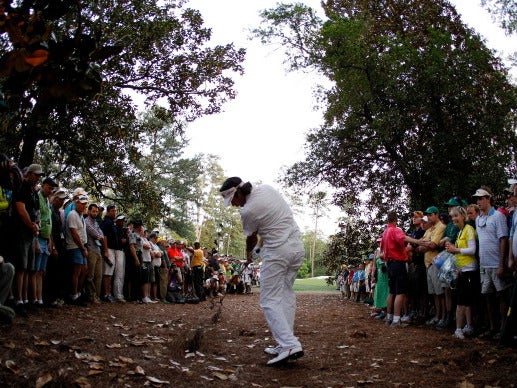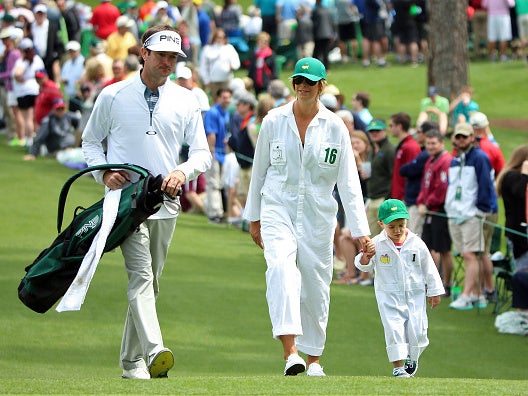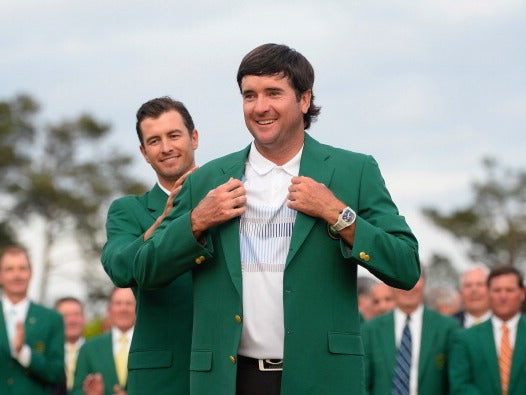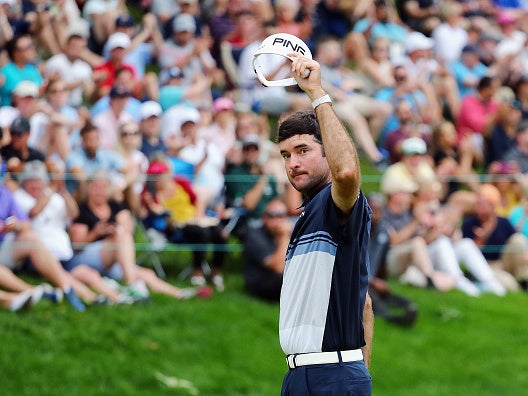The Open 2019 – Bubba Watson interview: ‘Life doesn’t stop just because you’re inside the ropes’
Exclusive: The two-time Masters champion talks about finding happiness, taking criticism and being more than just a golfer

Your support helps us to tell the story
From reproductive rights to climate change to Big Tech, The Independent is on the ground when the story is developing. Whether it's investigating the financials of Elon Musk's pro-Trump PAC or producing our latest documentary, 'The A Word', which shines a light on the American women fighting for reproductive rights, we know how important it is to parse out the facts from the messaging.
At such a critical moment in US history, we need reporters on the ground. Your donation allows us to keep sending journalists to speak to both sides of the story.
The Independent is trusted by Americans across the entire political spectrum. And unlike many other quality news outlets, we choose not to lock Americans out of our reporting and analysis with paywalls. We believe quality journalism should be available to everyone, paid for by those who can afford it.
Your support makes all the difference.“My mind is racing,” Bubba Watson says sharply. “Always running.” Perched on the edge of a sofa in the clubhouse at Royal Portrush after an afternoon practice round, Watson’s long-time caddie and close friend, Ted Scott, hands him a chocolate muffin as an antidote. “Well, who could possibly say no to that?”
The two-time major champion is electric in conversation, skipping from one topic to the next, switching from disarming honesty to dry jokes, from introvert to expressionist, with a coin flip. “I’m happy now,” he says.
After a period of illness and a flickering love for the professional game that almost led him to taking a break two years ago, those three words speak volumes about Watson’s search for the right state of mind.
“You get bogged down sometimes about what people say at you,” he says, joking that we’ve now entered the ‘therapy session’. “It hurts sometimes when people yell at you. As a grown man, I’m not ashamed or afraid to tell you, I cry. Why try and hide and be this tough guy? I’ve got feelings too. It hurts. It’s not easy coming out here, with people calling you names; I can’t bring my kids out to watch me because of it. That can make it hard to have fun.”
Watson has been making a concentrated effort to detach himself from being “just a golfer”. While he’s speaking, he drifts subconsciously back to his wife and two adopted children, wondering what they are doing now, rounding off his own answers by asking himself what type of father he is. “I’m always learning to be a better dad, a better husband,” he says.
He’s bought a Minor League baseball team, the Pensacola Blue Wahoos, 20 miles from where he grew up, owns a driving range, a Chevrolet dealership and a sweet shop. He’s set his sights on one day becoming mayor of the town.
As he’s become older – “and wiser,” he leaps to interject – he’s learned the art of taking time out. When his schedule becomes too overbearing, too segmented into meals, practice and tee-times, he’ll take a day out to sit and watch his baseball team play, bringing back the memories of his father, Gerry, who always dreamed Bubba would become a Yankee.
“Over the last 10 years, my life has changed,” he says. “Your name is out there, you see people write bad things about you, true or not. I don’t watch TV, the news, I don’t watch golf because I don’t want any more negativity in my life. If you say I’m a golfer, you’re limiting who you are as a person. People think because I play golf for a living life is perfect but I know how hard my life can be sometimes. Life doesn’t stop just because you’re inside those ropes.”
A few years ago, Watson was stricken with an undisclosed illness and lost 28lbs from his already wiry 6ft 3in frame. And, after making a gradual recovery, he went on to win three times on the PGA Tour last year, secured a spot on the Ryder Cup team and ended the season at world No 16.
“Is the positive being healthy again, or winning?” He says rhetorically.
***
It was at The Masters in 2012 that Watson was propelled into stardom by way of one of the most preposterous golf shots of the last decade. On Augusta’s 10th hole, in a play-off against Louis Oosthuizen, he had thrashed his drive deep into the trees to the right of the fairway. Left with no clear sight of the green, he scythed a blind hook 40 yards around the corner of a Carolina Cherry Tree, a Magnolia Tree and a TV stanchion, before the ball pitched 15 feet from the hole. It was the type of ludicrous shot only Watson, with his whirling self-taught home-run swing, could execute. And at 33 years old, it launched him onto a quirky and reluctant pedestal.

“We’re talking about a guy from Bagdad, Florida, who didn’t have much money growing up, never had a lesson, taught himself the sport… And my name is Bubba,” he laughs dryly. “Why me? Why did I win? I didn’t feel like I deserved it.”
For months, Watson locked the Green Jacket away in his closet. He didn’t look at it, touch it or allow anyone else to either. “I almost felt embarrassed, almost scared,” he continues. “I wanted to hide in a corner. I just wanted to be Bubba again.”
When he returned home to Florida, Watson’s phone was suddenly littered with messages from one-time acquaintances. At events, he felt the eyes of fans and spectators on his back, the pens foisted in his direction at every opportunity for autographs, the hoots and the heckles, the people rushing to pat him on the shoulder and, for a while, he hated it.
Once, when driving back from hosting a charity event, he and his wife, Angie, were followed by a stranger for over half an hour, causing them to sell their house and move to a gated community. The following day, when he refused to sign an autograph, a man began shouting at him, calling him “a liar” and a “terrible person”.

“If I run into you for 30 seconds, in those 30 seconds you’re going to decide if I’m a good or bad person,” Watson says. “If I just made a triple bogey and you say ‘Bubba can you sign this’ and I say no, you’re going to say ‘I don’t like Bubba Watson’. If I’m at dinner with my wife and you say ‘do you mind taking a picture and I say ‘no, I’m on a date,’ that guy is going to go ‘Bubba Watson’s a bad person’. That 30 seconds you get in life can make or break you.
“There’s a lot of positives to fame but there’s a lot of stuff that comes with it. It’s what you have to learn. When I was 12 years old dreaming about winning the Masters, you don’t know that people will love you, make fun of you, write nice messages to you, and hurtful ones too.”
Does he think he’s misunderstood?
Watson lets out a deep, throaty laugh, as though it were the most obvious question in the world.

“For sure, as you can tell, I talk a lot, I can out-talk anyone. I’d love to talk to every single person out there but I’m here trying to make history for myself.”
In a bid to show people “the real Bubba”, he’s taken to using social media as a way of breaking that 30-second window, showing off his goofy side as well as promoting children’s charities. He doesn’t want to go into detail about his philanthropy, but it’s well known that he’s donated hundreds of thousands of pounds.
“I don’t want popularity,” he says sincerely. “It’s just my way of telling you who I am, not just the golfer, the real person. Why be serious all the time? Why not laugh and joke around. When I’m on the golf course, it’s work, it’s a job. If I’m not smiling it’s because I’m focused. Social media lets people see that I do have a fun side.”
***
When Watson was growing up, his father always told him: “All a poor man has is the truth.” The first time that mantra came to fruition was when he told Gerry he wanted to be a golfer instead of a baseball pitcher. He preferred an individual sport, liked his own company, and is still only surrounded by a very small group of people. From his manager to his accountant, who he’s known since he was 14, the few people in this tight-knit circle are all close friends.
After Gerry took him to the driving range, Bubba started to harness his unique swing with a cut-down nine-iron. With lanky limbs, jolting leg movement and a swing that stopped, cocked and caused his whole body to jump in the air upon impact, Watson was precocious and unteachable at the same time. He never had a single lesson and rarely stepped onto the range, instead practising on the thin tree-lined fairways of Tanglewood Golf Club. For that reason, despite being able to generate a ball speed of almost 200mph, he remains arguably the purest feel player on the PGA Tour.
By the time he was 12, Watson was breaking course records at junior tournaments in luminous pink socks. He leans back slightly, cutting off his rapid tone of conversation briefly. “Have I always been different? I wouldn’t say different…Well, yeah…I’m definitely different,” he laughs with resignation.
His entry into professional golf was also unconventional. When he left Milton High School, his teachers doubted if he’d graduate from college, let alone become a 12-time winner on the PGA Tour. And, unlike the majority of players, he played golf at a community college in Alabama for two years before transferring to the University of Georgia.
It was there that he met Angie, a basketball scholar. After their first date, she told Watson that she couldn’t have children. Two weeks before his famous Masters victory, and four years after beginning the process, the pair adopted their first son, Caleb.

“My mum and dad raised me the best way they knew how, right or wrong, and I’ve turned out somewhat OK,” he laughs. “I couldn’t have asked for better parents and I want to be the best husband and father I can be. When you’re on the road for five weeks, I feel bad. I want to go home and love and support her. We’ve adopted two kids and it’s not easy making sure to raise them the right way. My parents always raised me to tell the truth, never to lie. Hopefully, that’s what I can teach my kids, bad or good, I’m going to tell you the truth.”
***
Despite reaching a more sentimental state of mind, Watson has no intention of toning down his desire to win just yet, nor any desire to place another deadline on a retirement date. ‘If I’m not on the course, I’d just be playing at home anyway. I can’t see golf ever going away from my life…unless I lose my arms. Then I’ll have to start kicking ball.”
Instead, he’s chasing a shot at a legacy that’s undefined. “I don’t know what it takes to make the hall of fame, but I feel I must be close,” he says. “Not for anybody else, just for my own personal satisfaction. You talk about 12 wins and two majors… it might never be enough, who knows, but I must be close. So, for me, to win another major…Gosh,” he pauses, imagining it. “At 40 years old, you don’t know how many more chances you’re going to get.”
Watson is no stranger to Portrush. After graduating high school when he was 18, he travelled to the mile-long peninsula with a close group of friends. Since returning on Monday morning, he’s played 36 holes, feels refreshed after taking two weeks off ahead of the tournament, and insists “he’s feeling really good” about his chances. Five years since his last victory at Augusta, and after narrowly missing out to Tiger Woods there earlier this year, he yearns for that shock of adrenaline.

“I just want the chance to feel it again,” he says. “To be there on Sunday, when your name is up there. I want to be in that situation again where you know if you pull off this shot, you’re walking away with the trophy. That’s what we’re all doing this for, no one turns up to finish 30th. I want to be there with a chance on Sunday.”
But faced with a wiry and rolling links, armed with blind tee-shots and tufty rough, Watson’s captivating blend of risk and imagination stands to be exposed. His driving can be erratic and move with a high, curving arc that’s at mercy to the coastal wind. “Visually, the field is already ahead of me,” he admits. “I hate to say it, but the British Open is the hardest tournament for me to win – that and the US Open. If you go in the rough there, you’re dead. If I can’t see it visually, I can’t feel it.”
A few friends have told him if he wants to seal that hall of fame legacy, he may need to relight and rile the emotions that characterised his earlier career; to “be fiery without freaking out”. The type of emotions that have been subdued over the past few years where he’s learned to find a balance between life on and off the course. And, really, that’s the answer to Watson’s own question. He’s happy, he has his family and his health – and that’s all that matters. He’s a dad, a business owner, a philanthropist and all the rest is noise.
So, is it about being healthy or winning?
“I’m healthy.”
Join our commenting forum
Join thought-provoking conversations, follow other Independent readers and see their replies
Comments